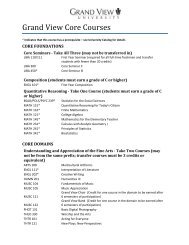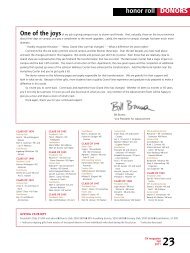MUNINN
MUNINN - Grand View University
MUNINN - Grand View University
- No tags were found...
You also want an ePaper? Increase the reach of your titles
YUMPU automatically turns print PDFs into web optimized ePapers that Google loves.
Churchill and the Atlantic Charter <strong>MUNINN</strong> Volume 2 (2013)Kingdom by what most considered an eventual release of the Empire. 2All of this was made possible by the relationship and friendshipbetween Churchill and Roosevelt; without it, the world may not haveseen the same outcomes of the war. The Anglo-American alliance ofWorld War I was not as deep as the “special relationship” that thesetwo leaders built during World War II, which carries on today.Although Britons were exposed to more and more antiimperialism,especially among their left wing parties, after conflicts andcomplications in Ireland, South Africa, Afghanistan, Iraq, andPalestine, during and after World War I, the majority of Britons simplytook the existence of the Empire for granted and even consideredhaving an Empire as being a Briton. Certainly this was the case forChurchill, who never fully grasped the potential implications of thisagreement if it were taken to its fullest measure. 3 Usually thearticulated common outcome is the focus an agreement, but in the caseof the Atlantic Charter much value was placed upon the cooperationitself. The special personal relationship of Churchill and Rooseveltbeing made into a special relationship between their nations was theimmediate outcome. 4To fully appreciate this, one needs to understand how thepersonal relationship between Roosevelt and Churchill began. As faras we know from declassified documents, they exchanged at least 1,700letters, messages, and telegrams in the five and a half years between theoutbreak of the war and Roosevelt’s death in 1945. The President andPrime Minister also spent over 120 days together in person during thewar, with the meeting for the Atlantic Charter being their first officialface-to-face opportunity. 5 The written correspondence between thembegan a year earlier, even before Churchill was prime minister. InAvalon.law.yale.edu/20 th _century/decade03.asp (Accessed September 4, 2013) Thedeclaration was signed by the US, UK, USSR, China, Australia, New Zealand, SouthAfrica, Canada, India, Costa Rica, Cuba, Dominican Republic, El Salvador, Guatemala,Haiti, Honduras, Nicaragua, Panama, as well as the governments-in-exile of AxisoccupiedCzechoslovakia, Greece, Luxembourg, Netherlands, Belgium, Norway, Poland,and Yugoslavia. Mexico, Philippines, Ethiopia signed later in 1942. Iraq, Iran, Brazil,and Bolivia signed in 1943. Liberia, France, and Ecuador signed in 1944. Peru, Chile,Paraguay, Venezuela, Uruguay, Turkey, Egypt, Saudi Arabia, Lebanon, and Syria signedin 1945.2By the end of the war, Churchill’s Conservative government lost to the British LabourParty under Clement Attlee, who immediately embraced the maximalist or anti-imperialinterpretation of the Atlantic Charter.3It should be noted that Britain made conflicting promises to Jews, Arabs, and the Frenchduring World War I in order to secure their support, so Churchill may have felt somefreedom to minimize the Atlantic Charter.4Winston Churchill and Franklin Roosevelt, Roosevelt and Churchill: Their SecretWartime Correspondence. Edited by Francis L Loewenheim, Harold D Langley andManfred Jonas (New York: Saturday Review Press/E.P. Dutton & Co, 1975), 3.5Churchill and Roosevelt, 4. Churchill was head of the Royal Navy during WWI butstepped-down after the failure of the Battle of Gallipoli.2







